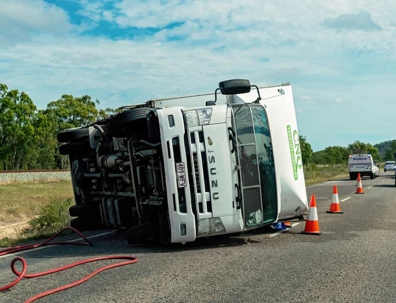Commercial trucks and tractor-trailers can weigh up to 80,000 pounds and are more likely than standard passenger vehicles to be involved in crashes that cause devastating losses. This includes collisions involving truck rollovers, which pose elevated risks of serious injury and death.
What is a Rollover Accident?
The Federal Motor Carrier Safety Administration (FMCSA) defines truck rollovers as an “overturn” of a large commercial vehicle. This can include crashes in which trucks roll multiple times and crashes in which a truck overturns onto either side.
Truck Rollover Statistics
Truck rollovers are among the deadliest crashes, as they frequently occur on freeways, ramps, and other higher speed roads and involve large vehicles that often depart from their lanes. Data from the FMCSA’s Large Truck Crash Causation Study paint a concerning picture about the dangers of truck rollovers:
- Truck rollovers account for roughly 4-5% of all fatal trucking crashes annually.
- Roughly 70% of truck rollovers involve large Class 8 tractor-trailers or tractors without a trailer attached (known as bobtails), and 30% involve single unit trucks.
- More than half of all truck rollovers (56%) occur on divided highways, 42% occur on two-way non-divided roads, and 2% occur on on-way streets.
- Nearly half (47%) of large truck accidents resulting in truck occupant deaths occurred in crashes involving rollovers.
What Causes Truck Rollovers?
According to the FMCSA, the vast majority of truck rollovers result primarily from driver error. The most common driver errors are:
- Excessive speed on curved roads
- Misjudging the sharpness of a turn
- Abrupt counter-steering / turning or swerving too fast
- Truck driver fatigue, impairment, or distraction
In addition to driver behaviors, truck rollovers can also be caused by vehicle-related issues such as:
- Improper cargo loading or securement
- Poorly maintained brakes or suspension
- Under-inflated tires
How Can Trucking Companies Prevent Rollovers
Trucking companies have obligations to take reasonable measures that ensure the safety of their fleet, drivers, and others on the road. When it comes to addressing risks associated with rollovers, trucking operators should:
- Employ properly trained, certified, and supervised truck drivers
- Conduct routine vehicle maintenance and perform necessary repairs
- Properly secure cargo to avoid unstable or shifting loads
- Comply with applicable cargo weight limits to avoid overloading trucks
- Comply with Hours-of-Service rules to prevent driver fatigue
Who is Liable for a Truck Rollover?
Attorneys who represent victims of truck crashes will typically conduct accident investigations to identify an underlying cause and the party (or parties) who may potentially bear liability. Depending on the facts of a case, this may be:
- A negligent truck driver and the trucking company that employed them.
- Another motorist that negligently caused or contributed to a truck rollover (i.e. cutting off a truck that swerved to avoid a collision and overturned as a result).
- A third-party responsible for cargo violations or negligent vehicle maintenance.
- A manufacturer, distributor, or retailer responsible for defective products or vehicle components.
Determining liability is a complex task that demands the attention of experienced attorneys. At Greene Broillet & Wheeler, LLP, our trucking accident lawyers have the insight and resources to conduct investigations, consult with experts, and address issues of negligence and insurance coverage so as to help our clients seek the maximum financial recovery possible.
If you have been injured in a truck accident or have lost a loved one in a fatal trucking collision, our award-winning team is available to review your case and legal options during a FREE consultation. Call (866) 634-4525 or contact us online to speak with a lawyer.

